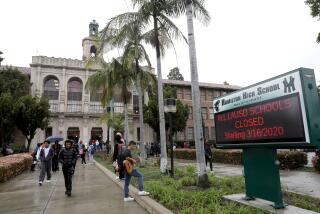Thompson Outlines ‘Worst-Case’ Steps to Cut Budget Deficit : Schools: Larger classes, fewer administrators, layoffs seen in face of L.A. district’s potential $143-million shortfall.
- Share via
To bridge a potential $143-million budget shortfall, Los Angeles school district Supt. Sid Thompson has recommended increasing class size by one student, slashing central administration and laying off or reassigning up to 1,477 employees, including assistant principals, counselors, nurses and janitors.
The two-page document given to the Board of Education on Thursday is Thompson’s first detailed outline of how the district should cope with a fifth consecutive year of stinging budget cuts that have axed more than $1.2 billon from the district’s approximately $4-billion budget.
“Let me be brutally honest,” Thompson said. “The cuts that this district faces for the next year, given what we have been through in terms of budget reductions for the past four years, are tragic.”
Thompson, stressing that the report is a worst-case scenario, suggested that the district’s central administration and regional offices take about a $19-million budget hit. He did not specify how many jobs would be lost or what programs provided by these offices would be eliminated. He said the amount is likely to change when a management audit of the district is completed next month.
Another $25 million in savings would come from increasing all class sizes by one. The savings would come from not filling 587 open teacher positions and laying off or leaving vacant another 303 clerical and other support service positions. Permission must be obtained from the State Board of Education before class size can be raised.
The other major cut that would directly affect schools would be laying off or reassigning 464 support staff members--including 171 janitors, 71 attendance counselors, 63 school nurses and 61 librarians--for a savings of $21 million.
Thompson is also recommending that the board again defer a $31-million repayment to the district’s workers’ compensation self-insurance fund and another liability insurance fund. Instead, he said, the district should make smaller payments over several years to replenish the accounts.
Thompson said the proposal is designed to allow schools to begin early planning in case the projections must be carried out. Over the next several months, school board members will debate and probably make changes in the recommendations.
Trustees must complete a preliminary budget by June 30 and a final document by Sept. 15.
Budget Director Henry Jones said he is making “every effort” to avert many of the proposed cuts by seeking new sources of funding that could bring in $45 million to $71 million. This includes possibly recouping up to $32 million in state funds associated with the district’s voluntary busing program.
Thompson said that his highest priority is to find money to avoid raising class size or eliminating school-site administrators--including assistant principals and continuation school principals.
Board members voiced an unwillingness to cut attendance counselors, who help provide state funding for the district by keeping youths in school. Several board members also said that eliminating most of the principals at the district’s 43 continuation schools would harm the district’s neediest and most at-risk students.
Board members also said that they do not intend to begin voting on any cuts until the management audit by the Arthur Andersen & Co. accounting firm is completed in mid-May.
District officials added $6 million to earlier projections of a $137-million shortfall, anticipating a drop in student attendance and an increase in the cost of running schools for adult education.
The projected deficit includes the $43-million cost of the teachers contract next year, $38 million for insurance liability, about $36-million for inflation and a $20 million loss of one-time funds used this year.
Thompson’s report does not address how the district will pay for the teachers contract, which restores 2% of a cumulative 12% pay cut. He said the 2% restoration and other costs will be funded with new revenues or the use of restricted accounts that Assembly Speaker Willie Brown (D-San Francisco) has promised to secure for the district.
More to Read
Sign up for Essential California
The most important California stories and recommendations in your inbox every morning.
You may occasionally receive promotional content from the Los Angeles Times.










